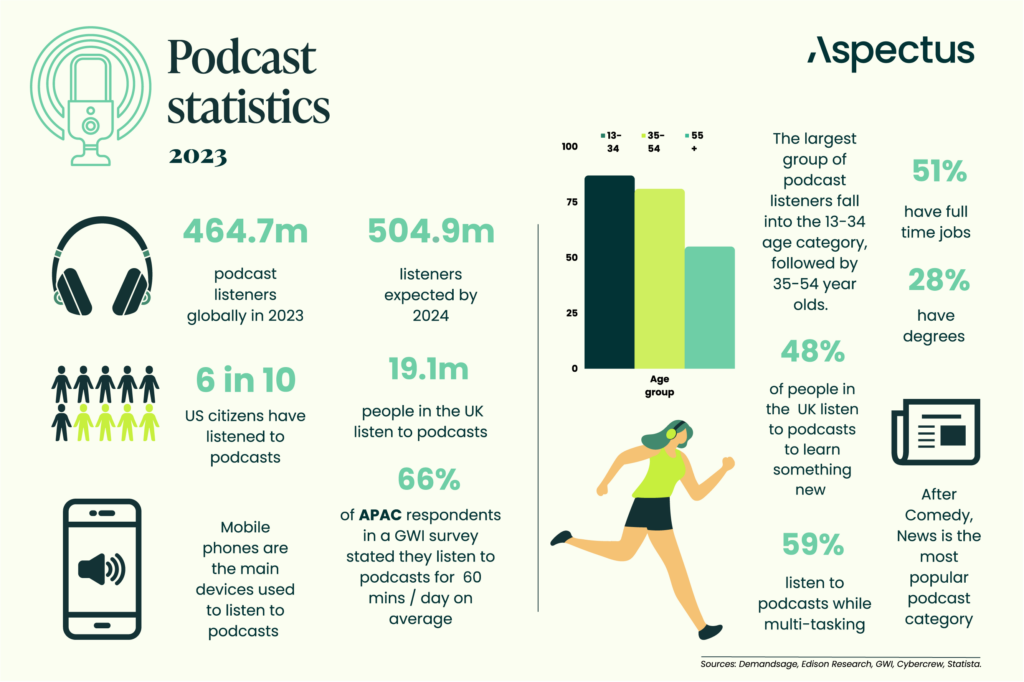5 reasons why podcasts are a powerful add to your content strategy

Maya Tan, Communications & Creative Content Director, Singapore
It’s the era of audio. Although podcasts have been around for a while, there’s been a phenomenal boom in the podcast landscape, especially in the last two years, as streamed on-demand content becomes increasingly a part of our lives, and the ease of access and richness of creative storytelling continue to appeal to millions of podcasts listeners around the world.
With engaged audiences tuning in for a dedicated amount of time to listen to long-form conversations on niche topics – how can brands and marketers leverage this? If you’re looking for a powerful storytelling and brand-building tool that’s highly engaging, authentic, speaks directly to your audience (and isn’t AI-generated!) – podcasts might just be the ticket.
Here are five reasons why you should add podcasts to your content strategy:
Podcast listenership is growing exponentially
As of February 2023, there are 464.7 million podcast listeners worldwide, with a forecast of
504.9 million podcast listeners by the end of 2024. The US leads with over 60% of the population having tuned in to podcasts, over half of UK citizens have listened to a podcast, while a consumer insight report by GWI states that, 66% of APAC survey respondents spend an average of 60 minutes a day listening to podcasts.
The increase in listeners is expected to grow in tandem with the rise of audio streaming platforms like Spotify and smart devices like Google’s Alexa, as well as the popularity and acceptance of social media influencers, many of whom host widely-subscribed podcasts.
Podcasts have also become a part of modern living. As consumers increasingly prefer on-demand content, accessible whenever, wherever, to suit their busy lifestyles, podcast consumption is a convenient way for them to build knowledge or be entertained. Research tells us that 59% of listeners multitask while consuming podcasts, e.g.during commutes, while doing chores or driving.
Meanwhile, news media from The Wall Street Journal to Singapore’s The Straits Times are boosting subscriptions with podcast offerings of their own. With podcast publishers such as iHeartPodcasts boasting 30 million unique visitors per month, the average reach of a podcast could potentially rival that of traditional media.
Opportunities for brand-building and thought leadership
One of the top reasons that podcast listeners tune in is to learn something. Podcast listeners are a captive audience ready to digest information. With most episodes clocking in between 20-40 minutes (longer than most broadcast interviews), podcasts offer opportunities to provide more information and enable listeners to learn more about your brand.
Because the shows are often delivered through casual conversation and soundscapes, audiences are more engaged in an intimate way, allowing for creative storytelling opportunities which are more powerful than static communications tactics such as newsletters, for example.
The search for authenticity is also real. A recent Nielsen study shows TikTok subscribers around the globe value authenticity and perceive content on the platform to be ‘authentic, genuine, unfiltered and trendsetting’. There’s a high chance that the popularity of podcasts is also fueled by listeners being able to tap into conversations and to discern for themselves if a brand is genuine and authentic.
This opens up possibilities to build trust with your audiences by shining the spotlight on your spokespeople. As they share their knowledge and expertise, it also allows audiences to associate a human voice and personality to the organisation, while displaying authenticity and thought-leadership, building meaningful relationships with listeners.
Versatility, audience targeting and building communities
The podcast is a versatile platform. Because you can target your audience with the subject category of the podcast, you can use it for external or internal communications, sparking conversations and inspiring action within communities, or to engage with a specific segment of the target audience to discuss your brand’s niche. Much like social media, each episode also provides a direct feedback loop via comments and analytics, making it easy to track audience sentiment, who your listeners are and where they’re based, what they react to and even how they react to different conversations, so that you can keep fine-tuning your show for targeted outcomes.
Never just a podcast
A podcast should never just be a podcast. With your key spokespeople sharing valuable knowledge and information, the conversations could be spun off into different forms of content that could be featured in other platforms within your marketing mix such as opinion editorials, short audio-visual excerpts for social media, LinkedIn articles or fodder for your e-newsletter. Tapping into the rising video-podcast trend could also be a way to create impact for your brand.
Quick turnaround, enabling timely commentary
Finally, podcasts can be relatively quick to launch and produce. The short turnaround time also means you can be proactive in terms of newsjacking, commenting on developments in your industry in a timely way, or to share your company’s position on hot topics in the news. With the ability to record speakers virtually from anywhere in the world, and a proactive editorial team on board, the podcast can be a flexible and powerful tool to add to your marketing or communications arsenal, to differentiate your brand and amplify your company’s messages.

